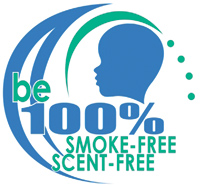Thirdhand Smoke: At Home or in Daycare, Is Your Child Safe From This Health Hazard?
The health risks of secondhand smoke – especially to children – are well known. But fewer people know about thirdhand smoke.
Thirdhand smoke refers to residue that remains on surfaces in areas where people have smoked a tobacco product after it has been extinguished.
Thirdhand smoke is dangerous. Cigarettes contain more than 7,000 harmful chemicals, including formaldehyde, arsenic, benzene, hydrogen cyanide and tobacco-specific nitrosamines, all of which cause cancer.
When tobacco is burned and smoked, a chemical reaction creates additional toxins that are released into the air.
The most notable is nitrous acid, which mixes with dust. This dust-acid mixture irritates the eyes and lungs, and can quickly reach toxic levels.
During the past year, the Lexington-Fayette County Health Department’s Community Health Equity and Education team has worked on a grant-funded project to educate childcare center staff, parents and grandparents about thirdhand smoke.
The Health Department focused on childcare centers because if their caregivers smoke on the way to work or during breaks throughout the day, children they care for are exposed to thirdhand smoke throughout the day.
The team is asking parents for feedback about the value of a smoke-free childcare center and whether they would pay more to guarantee that their children were not exposed to thirdhand smoke.
(Take the anonymous survey at www.surveymonkey.com/s/886G5VD)
Currently at childcare centers, as long as employees smoke outside, out of sight of children and follow local ordinances they are considered compliant.
However, childcare centers are increasingly adding health and wellness components to their policies to become more competitive.
Ideally, childcare centers will voluntarily adopt and enforce a policy with the following rules, which also apply to e-cigarettes:
- No smoking is allowed on childcare center property and there are no smoking areas.
- Employees may not report for work smelling of smoke or strong scents used to mask smoke.
- Employees may not leave the property or go to vehicles during breaks to smoke.
Thirdhand smoke can pose a greater health risk for both adults and children than secondhand smoke. Exposure can cause asthma in infants and increases their risk for SIDS.
If they live in a household where adults smoke, babies and young children crawl and fall asleep on rugs, furniture, carpet, bedding, etc., that are covered with years’ worth of thirdhand smoke.
Young children inhale more contaminated dust than adults because they spend time on the floor.
When a person smokes or lives with someone who smokes indoors, his/her skin, clothes and hair become saturated with thirdhand smoke.
If that person holds a baby or small child close, that child is exposed to all of the toxic chemicals in a cigarette and thirdhand smoke.
There are two action steps every parent or caregiver should take to protect their children from thirdhand smoke.
First, make the child’s indoor environment 100% smoke-free, including cars.
If there is an infant in the household, family members or visitors who have been smoking need to change their clothes and wash their hands thoroughly before picking up the baby.
Smokers who plan to hold the baby or young child can also wear a towel, blanket or jacket over their clothes when they smoke outside, then remove them before they come back inside.
Second, parents and caregivers need to encourage childcare centers to create strong tobacco policies.
Parents and families who have never smoked or do not have relatives who smoke likely assume their children are safe from exposure to thirdhand smoke, but this may not be the case.
Children from infancy through school age can be exposed to thirdhand smoke by childcare providers every day they are in care.
This is especially troubling for babies born prematurely, those with respiratory issues or young children with frequent ear infections.
Try to have a conversation with your center director but avoid busy times like drop-off and pick-up.
Angela Brumley-Shelton is a Certified Tobacco Treatment Specialist at the Lexington-Fayette County Health Department.
Info: www.lexingtonhealthdepartment.org. Click on the “Be 100% Smoke-Free, Scent-free” logo and encourage your friends and family members to do the same.
Stop smoking info: (859) 288-2457.


